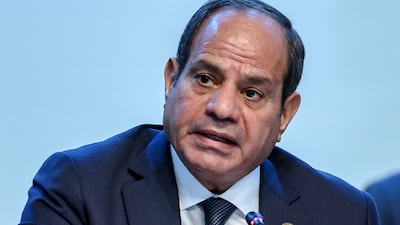Egypt's President Abdel Fattah El Sisi has raised the minimum wage for state employees and ordered financial support for pensioners in a package that will affect millions of citizens.
The measures were announced only a few months before the former army general is expected to seek re-election.
They were announced at a rally on Saturday in Beni Suef, south of the capital Cairo, which was attended by hundreds of cheering and ululating supporters in an atmosphere that indicated the unofficial launch of the president's election campaign.
After the rally, the Egyptian leader offered his condolences to the families of more than 70 residents of a nearby village who died in the flooding caused by Storm Daniel in Libya.
In office since 2014, Mr El Sisi has yet to say whether he intends to seek a third term in office when elections are held late this year or early in 2024.
It is, however, almost certain that the 68-year-old leader will seek another mandate. If he wins, that could take his rule to 16 years.
An amendment to Egypt's 2014 constitution proposed by an overwhelmingly pro-government parliament and adopted in a national referendum in 2019 extended presidential terms from four to six years, but kept two terms as the maximum a sitting president can serve. Mr El Sisi's first four-year term in office was not included in the two-term cap.

"No one, despite all the difficult circumstances we are going through, will stop us from pursuing the path we have chosen," Mr El Sisi told a cheering crowd in remarks that fell narrowly short of announcing plans to seek re-election.
Mr El Sisi said his government would raise the minimum wage for state employees from 3,600 Egyptian pounds ($116) to 4,000 a month. It would also double to 600 pounds a cost-of-living allowance for state and public sector employees as well as pensioners.
He also raised the ceiling for taxable income from 36,000 pounds a year to 45,000 pounds and instructed the main state-owned agricultural bank to accommodate farmers facing difficulty in repaying loans.
The measures are designed to help lower-income Egyptians cope with the nation's economic crisis, which is expected to be a key campaign issue.
However, critics have warned the new measures will fuel inflation and suggested their timing was linked to the forthcoming election.
Egypt's government has blamed the impact of the coronavirus pandemic and Russia-Ukraine war on global commodity prices for rampant inflation, which hit a record 39.7 per cent in August.
But Mr El Sisi's critics say the burden of servicing excessive borrowing and the billions of dollars his government has spent on mega national projects, including a new capital in the desert east of Cairo, could have gone to improving the ailing health and education sectors.

They also single out the military's large-scale involvement in economic activity and the sidelining of the private sector as contributing factors.
Mr El Sisi has defended his handling of the economy, saying the projects were sorely needed after decades of negligence and that the military's economic activity was meant to speed up the pace of development.
A foreign currency crunch has resulted in the shortage of vital imported goods, while local industries find it difficult to source materials and the local currency has lost about half of its value.
"I want to assure you in all honesty that I appreciate the magnitude of suffering faced by Egyptian families in the face of the cost of living," said Mr El Sisi on Saturday.
"The voices of Egyptians reach my ears. Their dreams are my dreams; and my hopes are no different from theirs. I feel your needs and I appreciate them," said the President, who again blamed the pandemic and war in Ukraine for the country's economic woes.
Striking a hopeful note, however, he said: "Only a number of steps now separate us, God willing, from a breakthrough." He did not elaborate.


